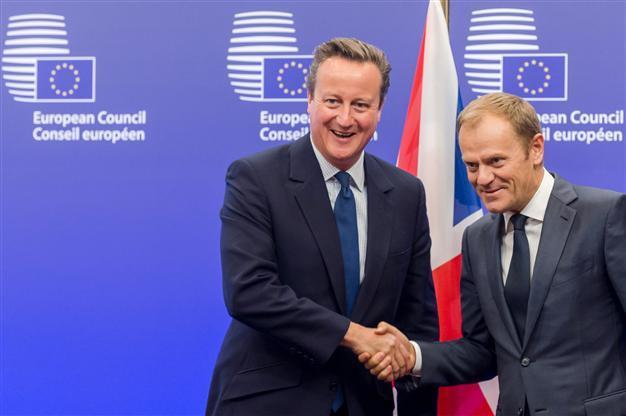EU executive sees British migration demands 'highly problematic'
BRUSSELS - Reuters

European Council President Donald Tusk, right, welcomes British Prime Minister David Cameron upon his arrival at the EU Council building in Brussels on Thursday, Sept. 24, 2015. (AP Photo/Geert Vanden Wijngaert)
The EU executive in Brussels sees demands made by British Prime Minister David Cameron on Nov 10 for new limits on the rights of EU citizens working in other member states as "highly problematic", a European Commission spokesman said.Asked at a news conference for the Commission's initial reaction to the letter, chief spokesman Margaritis Schinas said:
"Prima facie we see a number of elements which appear to be feasible, like finding ways to increase the role of national parliaments, some issues which are difficult, like ever closer union and relations between the euro ins and outs, and some things which are highly problematic as they touch upon the fundamental freedoms of the internal market.
"Direct discrimination between EU citizens clearly falls into this last category."
In his letter to European Council President Donald Tusk, published in London, Cameron proposed that EU citizens coming to work in Britain would not qualify for state benefits paid to British workers until they had been in the country four years.
An election promise made by his Conservative party, that proposal has been highlighted by many other EU leaders and experts as the most legally and politically difficult since it appears to discriminate between British and other EU workers.
Schinas said Commission President Jean-Claude Juncker, whose executive branch will be responsible for drafting possible new legislation and treaty amendments, was ready to cooperate.
"We took note of Prime Minister's Cameron's speech in which he states that he is open to finding different ways of reaching his objectives," he said, referring to a speech by Cameron earlier on Nov 10.
"The Commission considers the prime minister's letter as the beginning not the end of the negotiation and as President Juncker has repeatedly stated we stand ready to work for a fair deal with Britain that is also fair for all the other member states."
Tusk, whose role is to chair summits of EU leaders and forge consensus position across the bloc, confirmed receipt of the letter and said he would launch next week a round of bilateral consultations with the other 27 EU governments.
EU officials say those discussions would allow Tusk to take a view on what could be discussed or decided on the British demands at a summit of leaders in Brussels on Dec. 17-18.
















